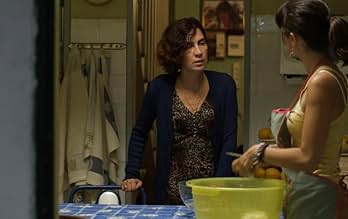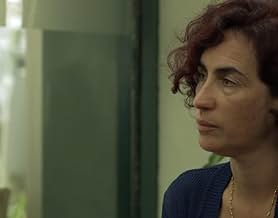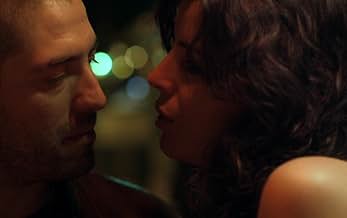CALIFICACIÓN DE IMDb
7.3/10
2.1 k
TU CALIFICACIÓN
Agrega una trama en tu idiomaA regular family living in the outskirts of Lisbon sees the serenity of their lives shaken beyond any remedy within a week.A regular family living in the outskirts of Lisbon sees the serenity of their lives shaken beyond any remedy within a week.A regular family living in the outskirts of Lisbon sees the serenity of their lives shaken beyond any remedy within a week.
- Dirección
- Guionista
- Elenco
- Premios
- 21 premios ganados y 9 nominaciones en total
Maria João Vaz
- Algarvio
- (as João Vaz)
- Dirección
- Guionista
- Todo el elenco y el equipo
- Producción, taquilla y más en IMDbPro
Opiniones destacadas
Going way over the safety of ninety minutes into the territory that is so often too long, at two hours twenty, Blood of my Blood easily justifies this extended playtime through captivating characters, patience, flawless pacing and a firm central premise that is supported with every tool at the filmmaker's disposal. The film utilizes a feature that often assists the longer films, it makes use of a large cast of characters. Though having some major focus, the film manages to drift around the experiences of several generations of one family, living in a low-income area of urban Portugal. The linchpin is the mother Marcia, who is a definite mother of the year candidate, just as Rita Blanco, who plays her superbly, is easily my performance of the festival so far. The other major characters are her twenty something kids Cláudia (Cleia Almeida) and Joca (Rafael Morais), then there's their partners, and Marcia's sister Ivete, who pretty much all live in the same tiny flat. Amongst the many links between characters, there are two central plot strands that stand out. Primarily, there's Cláudia's affair with her college professor and her mother's objections to it. Yet almost as prominent is Joca's hazardous attempts to rip off his drug dealer boss. These are quite conventional plot setups and therefore in no way do justice to the originality with which the film is put together. The heart of the film, its soul and its central premise is its interconnectedness. In terms of the plot, the various strands and characters – in addition to this one family at its core – often refer to one another, cross each other's paths, or their relations to one another gradually become apparent. In grander thematic terms, this interconnectedness is related to the strength of community in such a dense, low-income area. This results in the familial bonds being watertight, and people seem sure of themselves in ways that characters rarely do in the countless 'middle-class guilt, straight white men with lost souls' narratives that populate a great deal of art-house hits. In this respect, Blood of my Blood avoids depicting this community with a 'pity the poor' agenda, and although it doesn't suggest it is an aspirational way of life, it certainly doesn't give the usual 'unbreakable cycle destined to fail' scenario.
I suggest that should it be read as such, it will be by people that haven't themselves lived in, or experienced such a low-income community, where there are only two degrees of separation between anyone you might run into in a limited social circle; people that don't know how, within such a microcosm, people are looked out for. The plot very clearly postulates how family are there for one another in the way that Marcia stands by her daughter with such passion and strength, and how the more complex relationship between Jaco and his aunt Ivete plays out. But further to this, we see many subtle narrative elements that illustrate people looking out for each other, or having more than their own narrow motivations at the front of their mind. This is contrasted with the middle class teacher who Cláudia is having an affair with, who seems trapped in an arrested development, not clearly thinking about the wellbeing of Cláudia or for his own wife and family, or even for himself, acting in a familiar self-defeating manner (a human trait depicted so vividly by another outstanding film at the festival Post Tenebras Lux). The film lays the foundations for all these developments at pretty much the outset. After the first scene illustrates the neighborhood they populate and the hazards it contains, the following scene is an iconic dinner table scene. Always a narrative tool to develop and showcase family dynamics, this scene introduces all characters subtly, setting them up with a view to filling in the details as the film progresses. Rather than spoon-feeding exposition on individual characters at this point, the film is much more concerned with establishing the importance of the connections.
Further to these narrative examples, all formal elements worked in harmony with this premise, rather than being used for their own sake with style rather than substance. The interconnected theme was supported by inventive techniques such as the camera coming away from a conversation to allow another conversation to seep into the frame, with both then going on simultaneously; or by the fact that there is very rarely just one thing going on in frame; or that in the absence of any non-deigetic sound or music, the radio or TV can be heard or seen in the background pretty much throughout. This persistently emphasises the hectic nature of this life and that none of these people are islands. Additionally, the long takes – along with being a convention of non/anti-Hollywood cinema – act to gel the different characters together as part of the same organic space. Therefore form and content both support each other to show these characters to be connected as part of this not only literally, but socio-culturally and meta-physically densely populated space.
In spite of the melodramatic plot strands mentioned above, the film is more than anything an earnest and insightful snapshot of life. Over the final credits we hear some Portuguese hip-hop, featuring a chorus comprising of the sample of an American track repeating the words 'street life'. This sums the film up as far as I am concerned; it is simply a slice of street life. I don't think it was relentlessly grim, but nor do I think it was overly celebrated or glamorized; it was simply a slice of life.
I suggest that should it be read as such, it will be by people that haven't themselves lived in, or experienced such a low-income community, where there are only two degrees of separation between anyone you might run into in a limited social circle; people that don't know how, within such a microcosm, people are looked out for. The plot very clearly postulates how family are there for one another in the way that Marcia stands by her daughter with such passion and strength, and how the more complex relationship between Jaco and his aunt Ivete plays out. But further to this, we see many subtle narrative elements that illustrate people looking out for each other, or having more than their own narrow motivations at the front of their mind. This is contrasted with the middle class teacher who Cláudia is having an affair with, who seems trapped in an arrested development, not clearly thinking about the wellbeing of Cláudia or for his own wife and family, or even for himself, acting in a familiar self-defeating manner (a human trait depicted so vividly by another outstanding film at the festival Post Tenebras Lux). The film lays the foundations for all these developments at pretty much the outset. After the first scene illustrates the neighborhood they populate and the hazards it contains, the following scene is an iconic dinner table scene. Always a narrative tool to develop and showcase family dynamics, this scene introduces all characters subtly, setting them up with a view to filling in the details as the film progresses. Rather than spoon-feeding exposition on individual characters at this point, the film is much more concerned with establishing the importance of the connections.
Further to these narrative examples, all formal elements worked in harmony with this premise, rather than being used for their own sake with style rather than substance. The interconnected theme was supported by inventive techniques such as the camera coming away from a conversation to allow another conversation to seep into the frame, with both then going on simultaneously; or by the fact that there is very rarely just one thing going on in frame; or that in the absence of any non-deigetic sound or music, the radio or TV can be heard or seen in the background pretty much throughout. This persistently emphasises the hectic nature of this life and that none of these people are islands. Additionally, the long takes – along with being a convention of non/anti-Hollywood cinema – act to gel the different characters together as part of the same organic space. Therefore form and content both support each other to show these characters to be connected as part of this not only literally, but socio-culturally and meta-physically densely populated space.
In spite of the melodramatic plot strands mentioned above, the film is more than anything an earnest and insightful snapshot of life. Over the final credits we hear some Portuguese hip-hop, featuring a chorus comprising of the sample of an American track repeating the words 'street life'. This sums the film up as far as I am concerned; it is simply a slice of street life. I don't think it was relentlessly grim, but nor do I think it was overly celebrated or glamorized; it was simply a slice of life.
This sprawling drama about a Portuguese family combines melodrama and social realism so inventively that it practically occupies a genre of its own. Writer-director Joao Canijo grounds the movie in vivid observations of the Lisbon public housing complex where much of the action occurs, and his characterizations—developed, Mike Leigh-style, in close collaboration with the cast--have a similarly gritty authenticity. Yet the movie is also richly stylized, with old- fashioned tracking shots and compositions that allow for two conversations at once, and some narrative developments have the force of Greek tragedy. What emerges is an operatic portrayal of the working poor in which each character's struggle seems monumental. Rita Blanco and Rafael Morais are on top of their game with such deep and complex acting that makes us shiver. One of the best movies I've seen, ever! And definitely the best of 2011.
10vitor_04
This is a movie that i'll never forget. Rita Blanco is in the best (and when i say the best i mean the best) performance i've ever seen in cinema. Yes, i know - i'm Portuguese, it's predictable i would say this is a great movie. But the truth is that Joao Canijo sees the cinema exactly how i see it, going deep on characters and going deep on their misery, always with a peace of comedy and truth in it. it's not a complicated history, the sexual content in it it's not unnecessary and the music background was not written by big contemporany compositors. The only concern of Joao was to make a movie faithful to the inconditional love story behind a poor family with huge problems appearing.
This movie made a strong impact by exposing the scars of a society living on the margins. It humanizes and dignifies the suffering of the working class, refusing any glamourization or easy redemption. Canijo presents characters who live on the edge, doing so with fierce empathy, leaving the audience with the feeling of having lived, if only for a few hours, within that dark and intense universe. This film is, ultimately, a reflection on family love and the cost of survival in adverse conditions, where every choice is a double-edged sword. It is a work that leaves its mark, highlighting João Canijo's power to explore the human condition in its most complex and often uncomfortable dimensions.
There are no special effects, over-the-top car chases and its not in 3D. What lies at the center of this story is humanity and their daily joys and sufferings.
"Sangue do meu Sangue" is set in the sprawling barrios in the outskirts of Lisbon where everyday is a struggle for survival. The spotlight is placed on the Fialho clan. Marcia Fialho, the family matriarch has single handedly raised her two children: Claudia, a young woman with a promising future as a nurse engaged to Cesar and Joca who engages in nefarious activities to earn some cash. The family lives in a cramped apartment together with Ivete, Marcia's sister whose self-consiousnes adds to the drama in the story. Claudia is having an affair with her university professor, and Marcia vehemently opposes it. While Marcia focuses all her attentions on her daughter, her son is left unattended, though he has developed a close, almost incestuous relationship with her aunt Ivete. But their lives are about to become unstable through a series of events that will leave all of them shattered beyond repair.
Its very rare to find a movie where the characters aren't merely caricatures that have absolutely no motives for their actions and lack of passion. The characters formed by João Canijo, the director, are very complex and admirable. Marcia stands out as a model of female heroism as she will go to any length to defend her family, protect them and ensure their daily upbringing. Their emotionally unstable nature can also be seen through their hopes and actions.
The camera work and use of non-verbal communication is simply excellent, the mark of true film making and positioning of camera angles in order to communicate images that tell the story. All the characters carry their secrets, and in a setting where living space is cramped, the hushed whispers at strategic corners of the small apartment show that secrets cannot be easily hidden. For instance, Marcia and Claudia are forced to share a bed and conversations cannot be carried on in secret as characters will be passing by at one point or another.
Some of the pot twists that occur here are somewhat predictable, but they are done in such a way that you feel you are watching them for the first time.
This film is indeed a must watch, especially for those who appreciate film as a true work of art and entertainment.
"Sangue do meu Sangue" is set in the sprawling barrios in the outskirts of Lisbon where everyday is a struggle for survival. The spotlight is placed on the Fialho clan. Marcia Fialho, the family matriarch has single handedly raised her two children: Claudia, a young woman with a promising future as a nurse engaged to Cesar and Joca who engages in nefarious activities to earn some cash. The family lives in a cramped apartment together with Ivete, Marcia's sister whose self-consiousnes adds to the drama in the story. Claudia is having an affair with her university professor, and Marcia vehemently opposes it. While Marcia focuses all her attentions on her daughter, her son is left unattended, though he has developed a close, almost incestuous relationship with her aunt Ivete. But their lives are about to become unstable through a series of events that will leave all of them shattered beyond repair.
Its very rare to find a movie where the characters aren't merely caricatures that have absolutely no motives for their actions and lack of passion. The characters formed by João Canijo, the director, are very complex and admirable. Marcia stands out as a model of female heroism as she will go to any length to defend her family, protect them and ensure their daily upbringing. Their emotionally unstable nature can also be seen through their hopes and actions.
The camera work and use of non-verbal communication is simply excellent, the mark of true film making and positioning of camera angles in order to communicate images that tell the story. All the characters carry their secrets, and in a setting where living space is cramped, the hushed whispers at strategic corners of the small apartment show that secrets cannot be easily hidden. For instance, Marcia and Claudia are forced to share a bed and conversations cannot be carried on in secret as characters will be passing by at one point or another.
Some of the pot twists that occur here are somewhat predictable, but they are done in such a way that you feel you are watching them for the first time.
This film is indeed a must watch, especially for those who appreciate film as a true work of art and entertainment.
¿Sabías que…?
- TriviaPortugal's official submission to the Best Foreign Language Film category of the 85th Academy Awards 2013.
Selecciones populares
Inicia sesión para calificar y agrega a la lista de videos para obtener recomendaciones personalizadas
- How long is Blood of My Blood?Con tecnología de Alexa
Detalles
- Tiempo de ejecución2 horas 11 minutos
- Color
- Mezcla de sonido
- Relación de aspecto
- 1.85 : 1
Contribuir a esta página
Sugiere una edición o agrega el contenido que falta

Principales brechas de datos
By what name was Sangue do Meu Sangue (2011) officially released in Canada in English?
Responda






























